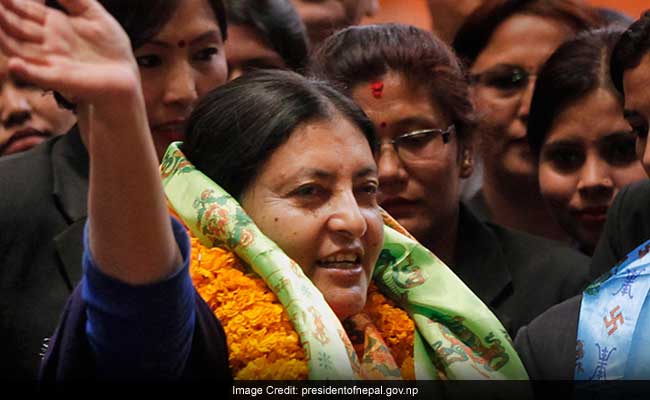Nepal's President has not signed the constitutional amendment that has been passed by the Parliament (File Photo)
Kathmandu:
Nepal
's President Bidhya Devi
Bhandari
has refused to sign an important bill to amend the Citizenship Act within the stipulated time frame.
Constitutional experts are calling this move of the President a violation of the Constitution.
Significantly, the bill has been passed twice by both the houses of the Parliament.
Bheeshraj Adhikari, a senior official in the President's Office, said the bill, after being passed twice by the National Assembly and the House of Representatives, was sent for the President's signature and he sent it back for reconsideration by Parliament.
After this the bill was again sent to Bhandari and he was to sign it by Tuesday midnight but he did not.
Speaker of the House Agni Prasad Sapkota re-approved the bill on September 5 and sent it to Bhandari.
Constitutionally the President has to sign the bill within 15 days but he has not done so.
The Second Amendment to the Citizenship Act was done with an aim to address the concerns of the Madhes community-centric parties and the NRIs.
At least five lakh people waiting to get national identity cards have been affected due to the bill not getting the President's assent.
The bill provides for grant of citizenship on matrimonial basis and ensures to grant citizenship to non-resident Nepalis living in non-SAARC countries without voting rights.
Due to this there is anger in a section of the society and it is being said that with this, foreign women will be able to get citizenship easily by marrying Nepali men.
Constitution expert and lawyer Dinesh Tripathi said, "This is a violation of the Constitution.
The President has violated the Constitution."
“A serious constitutional crisis has arisen before us.
The President cannot go against the Parliament.
It is the responsibility of the President to assent to a bill passed by the Parliament.
The entire constitutional process has been derailed."
Tripathi said that only the Supreme Court has the power to interpret the Constitution, the President does not have this power.
According to Article 113 (4) of the Nepali Constitution, if the bill is sent to the President again, he has to give it accordingly.
However, according to the President's Office, Bhandari has acted in accordance with the Constitution.
Adviser to the President on Political Affairs Lalbabu Yadav said, “The President is working in accordance with the Constitution.
The bill violated many constitutional provisions and it is the responsibility of the President to protect them.
